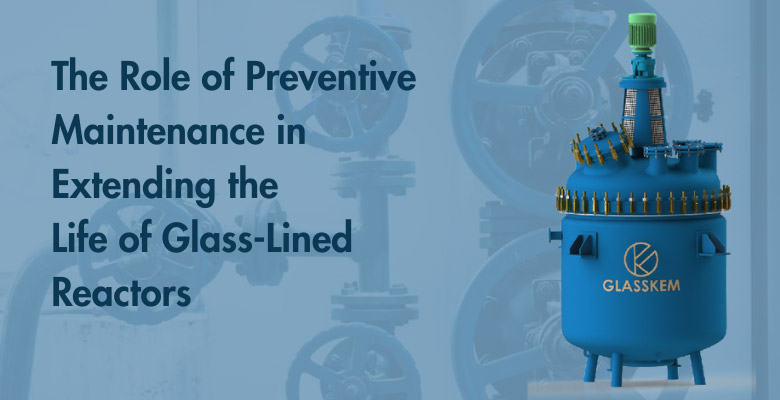The Role of Preventive Maintenance in Extending theLife of Glass-Lined Reactors
The Role of Preventive Maintenance in Extending the Life of Glass-Lined Reactors

Glass-lined reactors are critical assets in industries like pharmaceuticals, chemicals,
and food processing, where corrosion resistance and purity are essential. Despite their
durability, these reactors are not immune to wear and damage. That’s where preventive
maintenance plays a vital role—helping plants avoid costly downtime, extend
equipment life, and ensure operational safety.
Why Preventive Maintenance Matters
Unlike reactive maintenance, which addresses problems after they occur, preventive
maintenance is a proactive strategy. It involves regularly scheduled inspections and
upkeep to detect early signs of wear or damage before they lead to equipment failure.
For glass-lined reactors, this is especially important because:
- Minor defects can escalate quickly due to exposure to harsh chemicals.
- Unnoticed damage can contaminate batches, leading to product loss.
- Unexpected failure results in production delays and high repair costs.
Key Components of Preventive Maintenance for Glass-Lined
Reactors
1. Regular Inspections
Routine visual inspections and spark testing should be carried out at scheduled intervals. Look for:- Chips, cracks, or blisters on the glass lining
- Rust or corrosion near nozzles or manways
- Any changes in reactor performance or pressure readings
2. Cleaning and Decontamination
Clean the reactor using approved methods and tools that do not damage the glass lining. Avoid abrasive materials and harsh chemicals not compatible with the enamel.3. Monitoring Process Conditions
Track temperature, pressure, and pH levels to ensure they remain within the reactor’s specified limits. Rapid temperature changes and aggressive media can damage the lining over time.4. Torque Checks and Fastener Maintenance
Regularly check and retorque bolts and fasteners on flanged connections to prevent leaks and mechanical stress on the lining.5. Documentation and Record Keeping
Maintain logs of inspections, repairs, and maintenance activities. This helps in identifying trends and planning future maintenance schedules more effectively.6. Training for Operators and Maintenance Staff
Ensure that everyone handling the reactor understands proper operating procedures, cleaning protocols, and the importance of gentle handling to avoid mechanical damage.Benefits of Preventive Maintenance
- Increased Equipment Lifespan: Well-maintained reactors last significantly longer, delivering better ROI.
- Reduced Downtime: Early detection of issues prevents unscheduled outages.
- Cost Savings: Avoids major repairs and replacements through timely interventions.
- Improved Safety: Reduces risk of accidents caused by leaks or equipment failure.
- Consistent Product Quality: Keeps contamination risks at bay.
Conclusion
Preventive maintenance is not just a best practice—it’s a necessity for plants relying on glass-lined reactors. With regular inspections, proper handling, and timely interventions, you can protect your equipment, ensure smooth operations, and maximize the lifecycle of your investment.The Role of Preventive Maintenance in Extending theLife of Glass-Lined Reactors Read More »







